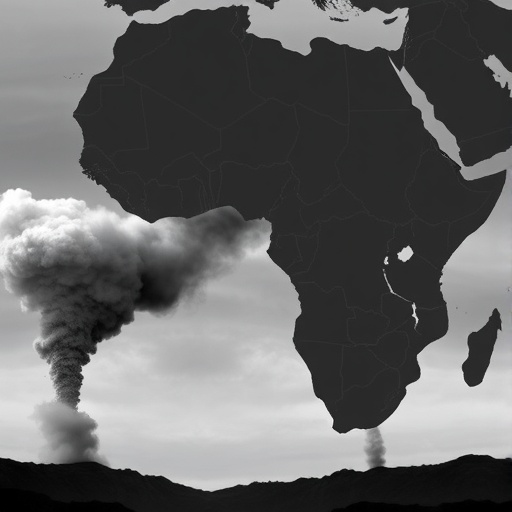Black carbon, a substance that arises from the incomplete combustion of various fossil fuels and biofuels, has come to light as a significant contributor to both climate change and public health crises. Recent research led by Yuxuan Ren from the McKelvey School of Engineering at Washington University in St. Louis reveals that the concentrations of black carbon in the Global South—regions that include developing countries across Africa, Asia, Latin America, and the Caribbean—have been grossly underestimated. This critical finding is vital as accurate estimations can influence policy decisions regarding air quality and climate change mitigation strategies.
Utilizing a variety of advanced models, the research team aimed to assess ambient black carbon concentrations by leveraging extensive data collected from the Surface Particulate Matter Network, known as SPARTAN. This global network, prominent for its rigorous measurement capabilities, provided a foundation for understanding black carbon emissions in a region where data is often scarce or unreliable. Through their comprehensive study, the researchers found that black carbon levels in low- and middle-income areas of the Global South were underestimated by approximately 38%. The implications of this finding extend beyond academic curiosity into the realms of public policy and health.
Measured in micrograms per cubic meter, black carbon concentrations are typically influenced by the types of fuel consumed and the combustion processes involved. In regions where diverse materials are burned, including agricultural waste, wood, and charcoal, this variability complicates the task of obtaining consistent and comparable measurement results. As Yuxuan Ren elaborated, different regions utilize varying burning practices for cooking and heating, leading to significant discrepancies in black carbon emissions. This variation can result in biased emission estimates, thereby obscuring the true scale of black carbon pollution in these areas.
.adsslot_eTbLAtFi5l{ width:728px !important; height:90px !important; }
@media (max-width:1199px) { .adsslot_eTbLAtFi5l{ width:468px !important; height:60px !important; } }
@media (max-width:767px) { .adsslot_eTbLAtFi5l{ width:320px !important; height:50px !important; } }
ADVERTISEMENT
The research revealed stark underestimations in key urban centers such as Dhaka, Bangladesh, where a multitude of combustion activities—ranging from crop residue burning to poorly regulated brick kilns—contribute significantly to black carbon emissions. In cities like Addis Ababa, Ethiopia, emissions stem primarily from diesel-fueled heavy vehicles and wood utilization for energy. Similar trends were found in Ilorin, Nigeria, and other locations like Mexico City and Kanpur, India. Such findings are not isolated; they resonate with a broader global context concerning air quality and public health, making it imperative to address the underestimated black carbon emissions across the Global South.
Ren’s research underscores the urgency of reassessing black carbon emissions based on actual data rather than relying solely on generalized assumptions. By integrating simulations with data from established emission databases and employing the GEOS-Chem open-source community model, the research has managed to provide nuanced insights into the connections between global emissions and localized measurements. This methodology highlights the complexities associated with emission inventories derived from diverse sources, where inefficiencies in fuel combustion may lead to underreported figures.
The implications of underestimating black carbon cannot be overstated. With the potential for two to four times greater emissions in areas like Bangladesh, Ethiopia, and Nigeria than current estimates suggest, the resulting radiative forcing on climate systems may be more pronounced than previously understood. This realization not only informs future climate models but also urges a more comprehensive approach to mitigating black carbon, intertwining health benefits and climate resilience as a dual objective.
Professor Randall Martin, Ren’s advisor and a prominent voice in the field, emphasizes the robust infrastructure of the SPARTAN network, which has consistently produced reliable measurements. The network’s ability to provide a global reference point allows for a more systematic evaluation of black carbon emissions. As Martin notes, the collective efforts of the SPARTAN team enhance the credibility of findings, fostering a greater understanding of an issue affecting both health and the environment.
As discussion surrounding mitigation strategies intensifies, the necessity of targeting black carbon emissions emerges as a critical point of action. The conditions in low- and middle-income countries present a unique opportunity to implement effective air quality management strategies that can simultaneously address health issues and climate change. Tackling black carbon can lead to multiple benefits, reinforcing the idea that climate interventions can also enhance the quality of life for millions exposed to poor air quality.
In conclusion, this renewed understanding of black carbon emissions in the Global South underlines the critical need for more accurate and localized data. As researchers like Yuxuan Ren delve into these pressing issues, the hope is that their findings can catalyze action that leads to a cleaner, healthier environment for all. Finding effective solutions will undoubtedly require collaboration across disciplines and borders, but the potential for positive change is immense. By shining a light on the underestimated consequences of black carbon emissions, this research paves the way for future studies and global projects aimed at mitigating the multifaceted impacts of this pollutant.
Subject of Research: Black carbon emissions in the Global South
Article Title: Underestimations of Black Carbon Emissions in the Global South Reveal Critical Climate and Health Issues
News Publication Date: July 31, 2025
Web References: None provided
References: Nature Communications
Image Credits: None provided
Keywords: Black carbon, climate change, air quality, public health, emissions, Global South, SPARTAN network, environmental science, pollution, mitigation strategies.
Tags: Black carbon emissionsblack carbon research findingsclimate change and public healthclimate change mitigation strategiesdeveloping countries environmental policiesfossil fuel combustion impactGlobal South air qualityincomplete combustion effectslow-income countries pollutionpublic health crises from air pollutionSPARTAN air quality networkunderreported black carbon levels





